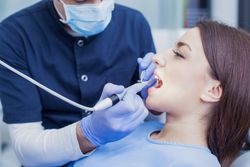Personal expression is essential to living a happy life, but it shouldn’t be at the expense of one’s oral health. That’s why dentists caution patients about the dangers of oral piercings. It’s safest to avoid these types of piercings completely. However, if you’re not ready to give up your jewelry, these tips can help you reduce the risk of complications.
A Guide to Oral Piercings
1. Tongue
The tongue is one of the most popular areas for oral piercings. Depending on the size of the jewelry, it can crack a tooth’s enamel from constantly bumping against the teeth. When enamel is cracked, bacteria can easily infiltrate deep inside a tooth, leading to a higher chance of developing cavities.
Carefully selecting jewelry size helps reduce the risk, but tongue piercings can also lead to serious oral infections. Always have a piercing performed at a reputable shop. Check references and perform an online search for reviews before committing to a piercing parlor. If you notice problems after getting pierced, check in with your dentist.
2. Lips
Top and bottom lips can be pierced, as well as either side of the mouth. Like tongue piercings, lip piercings also carry a risk of infection. Never share jewelry with other people, as bacteria may spread from their mouth to yours.
Proper cleaning is also crucial to oral health. Rinsing with mouthwash after eating will wash away food debris that is left behind. The outside of the piercing should also be cleaned on a regular basis. Use a cotton swab and saline to clean around the skin, and rinse with a warm saltwater solution to disinfect the part inside your mouth. If you remove the piercing, make sure it’s properly sanitized before replacing it.
3. Cheeks

Cheek piercings also crack enamel if you’re not careful. Choose a smaller piece of jewelry, and refrain from using your tongue to play with it inside your mouth. This will also prevent you from knocking the piercing loose and accidentally inhaling and choking on it.
If you’re allergic to certain metals, you could experience a severe reaction once the jewelry is in place. Oral and airway swelling is very serious and can even be life-threatening. There is also a risk of the jewelry becoming embedded in oral tissues, which often requires surgical intervention to remove. Make sure your piercer is aware of any metal allergies you have, and check the area regularly for swelling.
If you’re concerned about infection or another oral piercing issue, the team at Hulse Dental in Onalaska, WI, is proud to provide quality dental treatments while also making patients feel at ease. This clinic is led by Dr. Kurt Hulse, who is a member of the Wisconsin Dental Association, the American Dental Association, and is a past-President of the La Crosse District Dental Society. They provide routine exams and screenings, as well as advanced procedures, like dental implants and bridges. Call (608) 783-1306 to schedule an appointment with this kind and caring dentist. Learn more about this dentist office and their services online.
